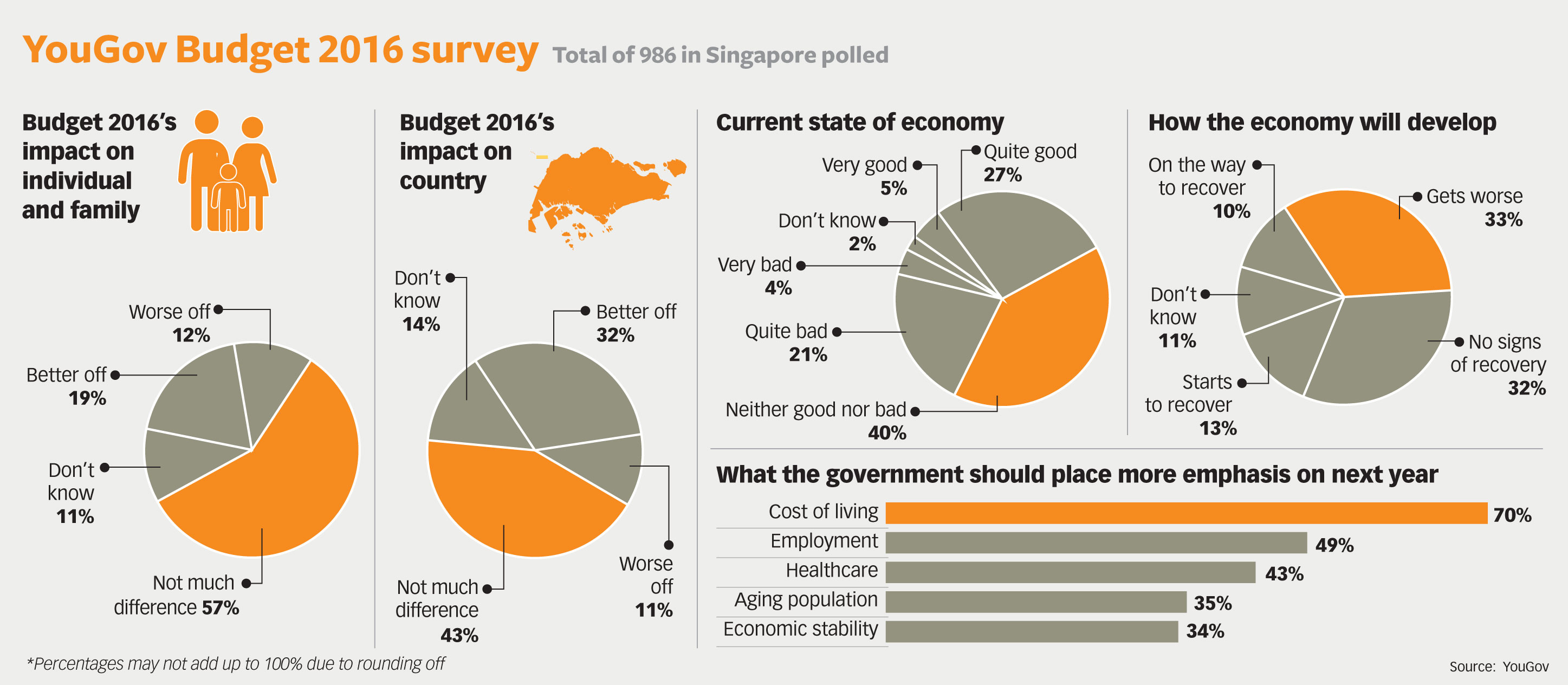Budget has 'right priorities but limited impact'

THE Singapore Budget 2016 had the right priorities, though it may not make much of an impact on a personal level, respondents to a poll have said.
They scored all but one of the government initiatives unveiled at least three on a five-point scale, where one stood for a policy of low priority, and five, one with high priority.
Social policies such as Workfare Income Supplement (WIS) Scheme and Silver Support Scheme fared well in these respondents' ratings; the lone initiative to earn a priority score fewer than three points was the National Outdoor Education Masterplan, which was graded 2.79.
The findings of the survey, conducted from March 26 to 28, were released on Friday by polling and research firm YouGov. The sample size was 986.
Finance Minister Heng Swee Keat, in presenting the Budget on March 24, unveiled a S$4.5 billion economic programme that integrated economic restructuring efforts while keeping an eye on short-term economic pressures. There was also a strong focus on social policies that were aimed at helping specific groups.
The WIS Scheme and Silver Support Scheme were well thought of by the survey respondents; they were accorded the highest priority at 3.96.
The WIS Scheme, which gives cash and CPF payouts to older, low-wage workers and those with disabilities to help them with living and retirement expenses, has been made more flexible.
The Silver Support Scheme, which gives cash payouts every quarter to the most vulnerable elderly, was lauded the best idea in a separate question, scoring 4.01.
Giving out one-off Goods and Services Tax (GST) cash vouchers to low-income households ranked second with a score of 3.99; the WorkFare Training Support scheme was third with 3.98.

Bread-and-butter issues were also at the top of respondents' minds when asked what they thought the government should focus on next year. The majority (70 per cent) said that the cost of living should be tackled, far more than the other issues listed.
Nearly half of them voted for employment; 43 per cent voted for healthcare, 35 per cent for tackling the issues related to an ageing population; 34 per cent cited economic stability as paramount.
Nearly half of the respondents (49 per cent) said they thought the Budget to be a fair one; one in five thought otherwise.
Among the respondents who thought the Budget to have limited impact, 57 per cent of them said it will not make much of a difference in their individual or families' lives in the coming year.
Nearly one in five (19 per cent) said the initiatives will make them better off, while 12 per cent said they would end up worse off.
Just over four in 10 (43 per cent) said the Budget would have limited impact on the country over the next 12 months, but nearly a third (32 per cent) said it would be good for the country as a whole.
Looking at the current state of the economy, the proportion of respondents who expressed optimism slightly outnumbered those who were pessimistic.
Those who responded either "very good" or "quite good"represented 32 per cent; those who said it was either "very bad" or "quite bad" made up a quarter.
About 40 per cent said the current economy was neither good nor bad.
soonwl@sph.com.sg

This article was first published on April 4, 2016.
Get The Business Times for more stories.